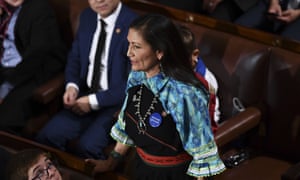‘I’ll be fierce for all of us’: Deb Haaland on climate, Native rights and Biden |
Debra Haaland is making American history.
The 60-year-old congresswoman from New Mexico will next month become the first Native American cabinet secretary in US history, when she takes responsibility for the country’s land and natural resources as head of the Department of the Interior under Joe Biden.
Haaland is a member of the Laguna Pueblo, one of 567 sovereign tribal nations located across 35 states. According to the 2010 census, 5.2 million people or about 2% of the US population identifies as American Indian or Alaskan Native – descendants of those who survived US government policies to kill, remove or assimilate indigenous peoples.
Come January it will also be Haaland’s job to uphold the government’s legally binding obligations to the tribes – treaty obligations which have been systematically violated with devastating consequences for life expectancy, political participation and economic opportunities in Indian Country.
In an interview days before her nomination, Haaland told the Guardian that as secretary of the interior she would “move climate change priorities, tribal consultation and a green economic recovery forward”.
It’s a big job with high expectations after four years of racist rhetoric and destructive environmental rollbacks by the Trump administration, which showed contempt for the climate or environment by green-lighting planet-heating fossil fuel projects on public and tribal lands with little regard for culturally and ecologically important sites.
“I’ll be fierce for all of us, for our planet, and all of our protected land,” said Haaland in her acceptance speech. “This moment is profound when we consider the fact that a former secretary of the interior once proclaimed it his goal to, quote, ‘civilize or exterminate’ us. I’m a living testament to the failure of that horrific ideology.”
Indigenous communities in the US, and globally, are disproportionately vulnerable to the impact of the climate crisis such as rising sea levels and droughts, and environmental hazards resulting from polluting industries. As secretary of the interior, Haaland will play a key role in undoing Trump’s rollbacks and will also be a key lieutenant in Biden’s new climate team.
This is not the first time Haaland has made history. In 2018, she became one of the first two Native women in Congress, alongside Sharice Davids of Kansas. In January, a record-breaking six Native Americans – four Democrats and two Republicans – will be sworn in.

Representation and diversity matter, according to Haaland, because life experiences shape political decisions. “We don’t need people who all have the same perspective, we need people from various parts of the country, who’ve been raised in different ways, who bring that history and culture with them, and employ what we’ve learnt from their parents and grandparents, and bring all of that to bear in the decisions that we make,” she told the Guardian.
It’s been a rocky road for Haaland who like a disproportionate number of Native Americans has experienced homelessness and relied on food stamps. She is also the product of racist policies such as the forced removal of thousands of Native children from their families between 1860 and 1978. At the age of eight, Haaland’s grandmother was sent to a Catholic boarding school for five years a hundred miles from home.
“There are a lot of people in this country who suffered historical trauma from that era. I carry that history with me, I’m a product of the assimilation policy of the United States. I feel very strongly that having this perspective is super important for the issues we bring to Congress.”
Haaland was elected to the House of Representatives in 2018 after campaigning under the slogan: “Congress has never heard a voice like mine.” Since then, she has introduced legislation that would establish a truth commission on Native American boarding schools and spearheaded two laws to combat the epidemic of missing and murdered indigenous women – crimes increasingly linked to transient extractive industry workers living in so-called man camps near or on tribal lands.
“Indigenous women have been missing and murdered since Europeans came to this continent in the late 1400s. Violence against women is a priority of mine. It’s not going to be fixed with just two pieces of legislation, but now it’s time to dig deeper and keep working,” she said.
Haaland will be the most senior Native American in the US government since the Republican Charles Curtis, a member of the Kaw nation situated in what is now Kansas, who served as vice-president to Herbert Hoover between 1929 and…
Read More:‘I’ll be fierce for all of us’: Deb Haaland on climate, Native rights and Biden |
